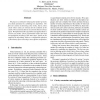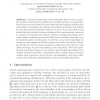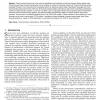201 search results - page 1 / 41 » Reducing the number of clock variables of timed automata |
RTSS
1996
IEEE
14 years 1 months ago
1996
IEEE
We propose a method for reducing the number of clocks of a timed automaton by combining two algorithms. The first one consists in detecting active clocks, that is, those clocks wh...
FSEN
2007
Springer
14 years 3 months ago
2007
Springer
Abstract. During the last years, timed automata have become a popular model for describing the behaviour of real-time systems. In particular, there has been much research on proble...
TSE
2008
13 years 9 months ago
2008
Timed Automata have proven to be useful for specification and verification of real-time systems. System design using Timed Automata relies on explicit manipulation of clock variabl...
ATVA
2010
Springer
13 years 10 months ago
2010
Springer
We study recursive timed automata that extend timed automata with recursion. Timed automata, as introduced by Alur and Dill, are finite automata accompanied by a finite set of real...
ICTAC
2005
Springer
14 years 2 months ago
2005
Springer
Abstract. This paper introduces the notion of finite precision timed automata (FPTAs) and proposes a data structure to represent its symbolic states. To reduce the state space, FP...



